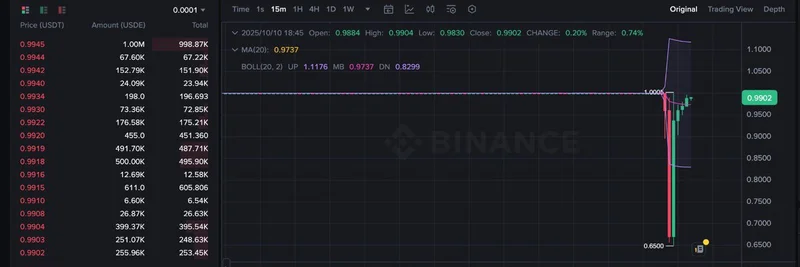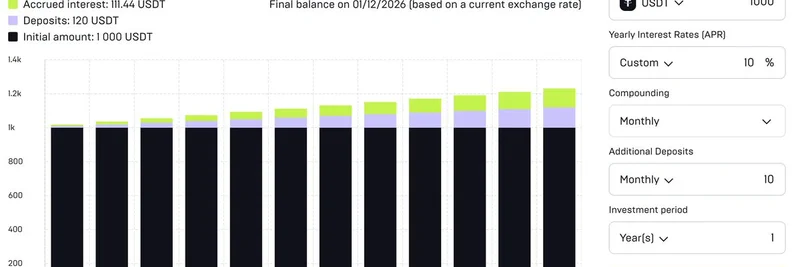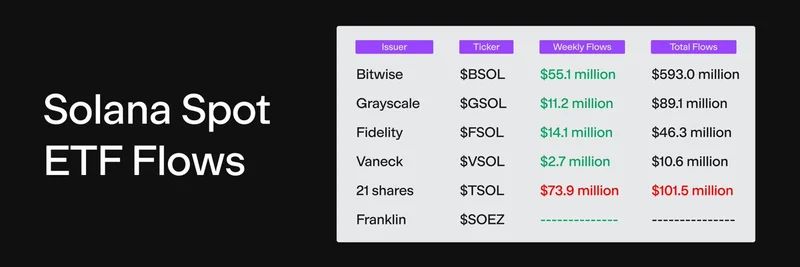In the fast-paced world of crypto, where fortunes can flip in seconds, a recent event involving Ethena's USDe stablecoin has everyone talking. It all started with a tweet from Omer Goldberg, founder of Chaos Labs, detailing how USDe's price temporarily plummeted to 0.65 on Binance amid a market sell-off triggered by news of Trump's China tariffs. Despite the chaos, the protocol held up, processing mints and burns without a hitch. But this incident underscores a bigger issue: the fragility of price oracles in our industry.
The Incident Breakdown
Let's break it down simply. USDe is a synthetic stablecoin from Ethena Labs, designed to maintain a $1 peg through hedging and collateral mechanisms. On October 10, 2025, amid broader market turbulence, its secondary market price on Binance dipped sharply. However, as Goldberg pointed out, the token remained overcollateralized, and protocols like Aave avoided massive liquidations thanks to Chaos Labs' advanced pricing methodology.
This methodology, born from debates in the Aave DAO, incorporates Ethena's Proof of Reserve oracle, ensuring more accurate risk assessment. It reportedly saved about $4.5 billion in positions and prevented $180 million in liquidation penalties. Kudos to the team for averting a potential cascade!
MartyParty's Take: Oracles as Single Points of Failure
Crypto commentator MartyParty, known for his sharp insights on macro trends and blockchain tech, chimed in on the thread: "More evidence my theories hold true 👏👏 Dollar price oracles are the biggest single point of failure in our industry together with centralized bridges and unregulated opaque order books." You can check out the full discussion here.
He's spot on. Price oracles are essentially data feeds that tell smart contracts the current market value of assets. They're crucial for DeFi apps like lending platforms (think Aave) or DEXes. But if they're centralized or poorly designed, they become Achilles' heels. Remember the Mango Markets exploit or past oracle manipulations? These aren't isolated; they're systemic risks.
Implications for Meme Token Enthusiasts
Now, why should meme token traders care? Meme coins like Dogecoin, Shiba Inu, or the latest viral sensations thrive on hype, volatility, and liquidity pools often powered by DeFi. But many rely on oracles for pricing in automated market makers (AMMs) or yield farms. A faulty oracle could lead to:
- Mispriced Trades: Imagine your favorite meme token getting liquidated unfairly because an oracle glitches during a pump or dump.
- Liquidity Drains: In interconnected ecosystems, a stablecoin wobble like USDe's can ripple to meme token pools, causing slippage or halted trades.
- Exploits and Losses: Hackers love targeting weak oracles. For meme projects built on quick launches, skimping on robust oracles (like those from Chainlink) is a recipe for disaster.
Replies to MartyParty's post echo this sentiment. Users praised Chainlink for securing Aave, while others called out centralized setups as "ticking time bombs." It's a reminder that in the meme space, where community and fun drive value, underlying tech like reliable oracles can make or break your portfolio.
Lessons and Best Practices
So, what can we learn? First, diversify your oracles—don't put all eggs in one basket. Projects like Chainlink offer decentralized alternatives that aggregate data from multiple sources, reducing manipulation risks.
Second, stay informed on protocol audits and DAO discussions. The Aave community's debate on USDe pricing saved the day here. For meme token creators, integrating battle-tested oracles from the start can build trust and longevity.
Finally, in volatile times like these, with geopolitical news swaying markets, always DYOR (do your own research) and consider hedging strategies. Tools like Ethena's USDe aim to provide stability, but as this event shows, nothing's foolproof.
As we build a more resilient blockchain ecosystem, events like this USDe dip serve as valuable wake-up calls. Keep an eye on evolving oracle tech—it's the backbone of DeFi, and by extension, the meme token revolution. What are your thoughts on oracle risks? Drop them in the comments below!



